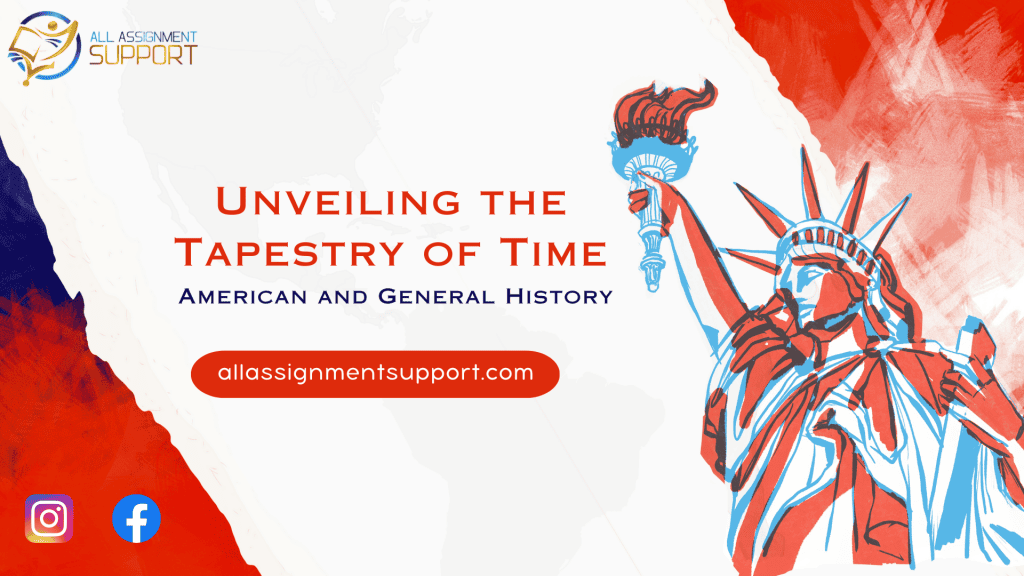Table of Contents
ToggleIntroduction
Are you preparing to write a history research paper? If so, why not research the vast field of American history? American history has many topics, debates, and intriguing stories, and so much information exists to explore and consider. So, if you have to write an academic paper, feel free to delve into the fascinating history of the United States. This study area offers numerous noteworthy discussions, events, and facts.
Whether you’re drawn to controversial events or amazing historical feats, American history has something for everyone. Do not worry if you are still undecided about your topic. Our blog post is here to help. We’ve compiled a collection of compelling American history research paper topics, for you to unveil and discover. Alongside, you will also have a view on some of the authentic History research paper topics for college students that you can have a look at.
What is a History Research Topic?
A history research topic is a specific subject or question within the field of history that researchers aim to explore, analyze, and understand through systematic investigation and study. A narrowly defined area of interest is the foundation for a research project, like a paper, thesis, or dissertation.
A broad range of topics, including events, people, social movements, cultural fads, economic changes, political developments, and more, can be covered in history research topics. These subjects have been selected with care to offer an understanding of the past and frequently help to develop a deeper understanding of how past events and influences have shaped the present.
A history research topic typically involves formulating a research question or hypothesis that guides the research process. This question is designed to be specific, researchable, and thought-provoking, inviting analysis and interpretation.
On the contrary, while American History research paper topics just cover chronological events that had taken place in America during the yester era, the History research paper topics for college students, cover the overall historical incidences that cover all parts of the globe. This is the main point of difference between both the underlying concepts we are trying to explain on the whole.
How to Write a History Research Topic?
In order to write well researched historical topics, you must perform the following steps. Helping you get started with the same:
Choose a Specific Focus
Your topic should be narrow enough to allow for in-depth analysis, but broad enough to find relevant sources.
Formulate a Clear Question
Your research topic should be phrased as a clear, concise question that highlights the main issue or aspect you’re investigating.
Highlight Significance
Explain why your chosen topic is important in the context of American history and how it contributes to existing scholarship.
Identify Scope
Define the time period and geographical scope of your research to narrow down your focus.
Use Keywords
Incorporate relevant keywords that will help you find sources during your research.
How to Choose a Relevant Topic?
Choosing a relevant topic is crucial for a successful research project. Here’s a straightforward guide on how to select a relevant topic:
Personal Interest
Start by considering what genuinely interests you. A topic you’re passionate about will keep you engaged throughout the research process.
Narrow Down Broad Interests
If your interest is broad (e.g., “World War II”), narrow it down to a specific aspect (e.g., “The Role of Women in World War II”).
Alignment with Course/Objectives
If the research is for a class, ensure the topic aligns with the course content and objectives.
Available Resources
Check if there are sufficient sources, both primary and secondary, to support your research.
Originality
Aim for a unique angle or perspective on your chosen subject. Avoid overused or clichéd topics.
Feasibility
Consider the scope and timeframe of your project. Make sure your topic is manageable within the given constraints.
Relevance to Current Discussions
Choose a topic that relates to current debates, issues, or trends within history or society.
Significance
Evaluate the historical or societal importance of your topic. Will your research contribute to existing knowledge?
Access to Archives/Databases
If your topic requires access to specific archives or databases, ensure you can access them easily.
Ethical Considerations
Be mindful of potential ethical concerns related to your topic, especially if it involves sensitive or controversial subjects.
Pilot Research
Conduct preliminary research to ensure your topic is viable and engaging.
Understanding American History Research Paper Topics
Understanding the American history research topic involves delving into the multifaceted layers of history, society, culture, and events that have shaped the United States. It explores how various elements have interacted and changed over time to uncover the stories and forces that have shaped the country. Recognizing the significance and complexity of American history research topics is crucial to understand their essence fully.
Let us have a look at pertinent pointers connected with the same:
Interdisciplinary Exploration
The American history research topic isn’t confined to a single field. It crosses over to political science, economics, sociology, literature, and more. This interdisciplinary nature allows for examining various facets of the American experience, resulting in a comprehensive understanding.
Contextual Analysis
Understanding the American history research topic requires placing events, individuals, and movements within their historical and social context. This context is crucial for comprehending the motivations, challenges, and consequences that shaped American history.
Diverse Narratives
The history of America is woven together from a variety of tales. It includes stories of Native American tribes, international immigrants, people who were held as enslaved people, women, and various underprivileged groups. The study of these accounts sheds light on the experiences that are frequently kept silent.
Temporal Range
The American history research topic spans centuries, from the colonial era to the present. Exploring this vast timeframe allows researchers to track patterns, transformations, and continuities that have unfolded over generations.
Themes and Movements
Numerous themes and movements define American history – the fight for independence, westward expansion, industrialization, civil rights, feminism, and technological advancements, to name a few. Understanding these themes helps researchers connect the dots across different periods.
Analyzing Change and Continuity
The American history research topic involves scrutinizing both change and continuity. How have fundamental principles, values, and institutions evolved, and, what elements have remained relatively consistent?
Historical Significance
An essential aspect of understanding the American history research topic is discerning the historical significance of events and individuals. Which events have had a lasting impact? Which figures have shaped policy, culture, and society in profound ways?
Cultural and Social Dynamics
Exploring the American history research topic necessitates delving into the cultural and social dynamics that have influenced the nation’s development. This includes examining art, literature, music, religious beliefs, and social norms.
Relevance to Today
Understanding the American history research topic isn’t solely about the past. It’s about recognizing how historical events and decisions continue to resonate in contemporary society. Many issues today have roots in the past, making historical analysis crucial for informed decision-making.
Significance of History research paper topics for College students
As we scan through deep diving incidents that had taken place in America during centuries to shape up the continent for what it is today, we must also evaluate the historical incidences that were taking place in other parts of the globe. Hence going through History research paper topics for College students will help you discover the temporal range between the History of America Vs the History of the World for you to differentiate between!
Top American History research paper topics and History Research Paper Topics for College students
Are you finding it challenging to decide on the perfect topic for your history research paper? No worries! To simplify the process of choosing, we’ve meticulously categorized American history topics based on different periods. Feel free to explore the comprehensive list below and select an American history topic that resonates with your interests and is conducive to your writing. We have also compiled History Research paper topics for College students category wise:
Revolutionary Era and Early Republic (1770s-1800s)
- Women’s Role in the American Revolution
- The Federalist Papers’ Effect on the Constitution
- the significance of, and causes for, the Whisky Rebellion
- Liberties vs. National Security under the Sedition and Alien Act
- The Financial Strategy of Alexander Hamilton and Its Effects
- The Diplomacy and Expansion of the Louisiana Purchase
- Achievements of Thomas Jefferson’s Presidency and Contradictions
- Causes, Results, and National Identity of the War of 1812
- Slavery, territorial expansion, and the Missouri Compromise
- The Impact of the Monroe Doctrine
Slavery, Abolition, and Civil War (1800s-1860s)
- Frederick Douglass and the Power of Narrative.
- Causes, Events, and Aftermath of Nat Turner’s Rebellion:
- Networks, Key Figures, and Successes in Underground Railroad
- Legal and Social Ramifications in Dred Scott v. Sandford
- The reasons for and effects of the Emancipation Proclamation.
- African Americans as Soldiers, Spies, and Freedom in the Civil War.
- Women’s Suffrage Movement: Challenges and Intersectionality.
- Conspiracy Theories and the Historical Impact of the Lincoln Assassination.
- Successes, Failures, and Unfinished Business During the Reconstruction Era.
- End of Reconstruction and Consequences of the 1877 Compromise.
Industrialization and Progressive Era (1870s-1920s)
- Monopolies, Trusts, and Regulation in the Rise of Big Business.
- Worker rights, unions, and labour movements.
- Social, political, and economic reforms that are progressive.
- After Suffrage, Women’s Rights Face New Challenges and Frontiers.
- Motivations, Results, and Imperialism in the Spanish-American War.
- Mobilisation and Impacts of World War I on American Society.
- The art, literature, and cultural identity of the Harlem Renaissance.
- Causes, Effects, and Repeal of the Prohibition Period.
- Quotas, exclusion, and assimilation in immigration and nationalism.
- Red Scare and Palmer Raids: Fear of Communism in the U.S
Great Depression and World War II (1930s-1940s)
- Causes of the 1929 stock market crash and its effects on the economy.
- Policy, criticism, and legacy of the New Deal.
- Environmental Crisis and Government Response in the Dust Bowl.
- Influence of propaganda during World War II on public opinion.
- Civil liberties vs. national security during the WWII internment of Japanese people.
- Science, morality, and the Manhattan Project: the atomic bomb.
- Women’s Contribution to the War Effort: Rosie the Riveter.
- Immigration and refugee policy in America after the Holocaust.
- Diplomacy and the Division of Postwar Europe at the Yalta Conference.
- The arguments and effects of Truman’s decision to detonate the atomic bomb.
Cold War and Civil Rights Movement (1950s-1960s)
- McCarthyism and the Red Scare: The Impact of the HUAC Hearings.
- The Korean War: A Forgotten War or Crucial Cold War Episode?
- Desegregation in Schools: Brown v. Board of Education.
- Rosa Parks and the Montgomery Bus Boycott: Catalyst for Change.
- Cuban Missile Crisis: Superpower Confrontation and Nuclear Threat.
- Civil Rights Act of 1964: Legislation and Societal Transformation.
- Malcolm X and Martin Luther King Jr.: Divergent Approaches to Equality
- Vietnam War: Causes, Controversies, and Anti-War Movement.
- The Black Panther Party: Activism, Ideology, and Legacy.
- The Space Race: Cold War Competition and Technological Advancements.
Counterculture and Contemporary America (1970s-Present)
- Watergate Scandal: Nixon’s Downfall and Government Accountability.
- Roe v. Wade: Abortion Rights and Moral Dilemmas.
- Environmental Movements: Earth Day, EPA, and Climate Change.
- Iranian Hostage Crisis: Diplomatic Tensions and American Identity.
- Reaganomics: Economic Policies and Socioeconomic Impact.
- AIDS Epidemic: Medical Responses and Social Stigma.
- Gulf War (1990-1991): Motivations and International Relations.
- 9/11 Attacks: National Security, Patriotism, and Civil Liberties.
- Immigration Debates: Border Control, DACA, and Identity.
- Black Lives Matter Movement: Racial Injustice and Activism Today.
Cultural and Social History
- Jazz Age: Music, Dance, and Changing Social Norms.
- Hollywood Red Scare: Blacklisting and Entertainment Industry.
- Rock ‘n’ Roll Revolution: Music, Rebellion, and Cultural Impact.
- Women’s Liberation Movement: Second Wave Feminism and Beyond
- LGBTQ+ Rights Movement: Struggles, Achievements, and Challenges
- Hip-Hop Culture: From Subculture to Global Phenomenon.
- Internet Revolution: Technological Advancements and Social Changes
- Reality TV and Celebrity Culture: Influence on American Society.
- Video Game Industry: Evolution, Cultural Impact, and Controversies.
- Social Media and Political Activism: Arab Spring, #MeToo, and Beyond.
Political and Diplomatic History
- Presidential Scandals: From Teapot Dome to Clinton-Lewinsky.
- S. Foreign Policy in the Middle East: Israel, Oil, and Conflict.
- Panama Canal and American Imperialism: Engineering and Control.
- NAFTA and Globalization: Economic Integration and National Interests.
- Supreme Court Landmark Cases: Shaping Constitutional Interpretation.
- Patriot Act and Civil Liberties: Balancing Security and Freedom.
- S.-Soviet Relations during the Cold War: Confrontation and Cooperation.
- S.-China Relations: From Recognition to Economic Rivalry.
- War on Drugs: Policies, Racial Disparities, and Socioeconomic Impact.
- Cybersecurity and Digital Warfare: New Frontiers of Conflict.
Economic and Technological History
- Industrial Revolution in America: Transforming Work and Society.
- Gold Rushes and Westward Expansion: Economic Opportunities and Challenges.
- Great Depression and New Deal Programs: Economic Recovery Strategies.
- Dot-Com Bubble and Bust: Internet Economy and Speculation
- Energy Crises: Oil Embargoes, Renewable Energy, and National security
- Suburbanization and Urban Renewal: Changing Landscapes and Communities.
- Consumer Culture: Advertising, Mass Production, and Materialism.
- Financial Crises: 2008 Recession and Regulatory Reforms.
- Automation and the Future of Work: Impact on Labor and Economy.
- Cryptocurrencies and the Evolution of Digital Currency.
Military History
- American Revolutionary War Battles: Strategies, Outcomes, and Significance.
- Civil War Generals: Leadership Styles and Military Strategies.
- World War I Battles: Trench Warfare, Technological Innovations, and Tactics.
- World War II Battles: D-Day, Pacific Theater, and Turning Points.
- Korean War Battles: Stalemate, Attrition, and International Involvement.
- Vietnam War Battles: Guerilla Warfare, Tet Offensive, and Lessons Learned.
- Gulf War Battles: Air Campaign, Ground Operations, and Coalition Warfare.
- War in Afghanistan: Counterterrorism, Nation-Building, and Endless War.
- Iraq War: Preemptive Strikes, Insurgency, and Regional Implications.
- Evolution of Military Technology: From Muskets to Drones.
Now, let us move on to History Research paper topics for College students for your deeper level of understanding:
Ancient Civilizations
- The Role of Women in Ancient Egyptian Society.
- The Code of Hammurabi: Justice and Legal Systems in Ancient Mesopotamia.
- The Rise and Fall of the Indus Valley Civilization.
- Ancient Greek Democracy: Origins and Influences.
- Roman Gladiators: Entertainment and Social Impact.
- The Maurya Empire and Emperor Ashoka’s Contributions.
- The Great Wall of China: Purpose, Construction, and Legacy.
- The Inca Road System: Communication and Trade Routes.
- Pyramids of Mesoamerica: Cultural Significance and Architecture.
- The Phoenician Alphabet: Spread and Impact on Communication.
Medieval Times
- Feudalism and Its Impact on Social Structures.
- The Crusades: Religious Motives and Long-Term Consequences.
- Medieval Knights: Chivalry, Warfare, and Ideals.
- The Hundred Years’ War: Causes, Battles, and Effects.
- The Magna Carta: Establishment of Rights and Limitations on Power.
- The Black Death: Origins, Spread, and Societal Changes.
- The Byzantine Empire: Political Intrigue and Cultural Preservation.
- Islamic Golden Age: Scientific, Philosophical, and Cultural Achievements.
- Viking Expansion and Settlements.
- The Samurai: Honor, Code, and Role in Japanese Society.
Early Modern Era
- The Renaissance: Artistic, Scientific, and Intellectual Transformations.
- The Age of Exploration: European Voyages and Global Impact.
- The Protestant Reformation: Martin Luther’s Theses and Religious Shifts.
- The Ottoman Empire: Expansion, Governance, and Cultural Exchange.
- The Scientific Revolution: Discoveries and Their Influence.
- The Enlightenment Thinkers and Their Ideas on Government and Society.
- The Atlantic Slave Trade: Economic Factors and Human Suffering.
- The French Revolution: Causes, Phases, and Outcomes.
- Industrial Revolution: Technological Advances and Social Transformations.
- The American Revolution: Causes, Battles, and Founding Principles.
Modern Times
- The Age of Imperialism: European Colonization and Its Impact.
- World War I: Causes, Alliances, and Treaty of Versailles.
- The Russian Revolution: Bolshevik Rise and Communist State.
- The Great Depression: Economic Crises and Responses.
- World War II: Global Conflict, Holocaust, and Postwar Reconstruction.
- Cold War Era: Superpowers, Proxy Wars, and the Space Race.
- The Civil Rights Movement: Segregation, Protests, and Legal Changes.
- The Vietnam War: Controversies, Anti-War Movement, and Legacy.
- Apartheid in South Africa: Nelson Mandela and the Road to Equality.
- Fall of the Berlin Wall: End of the Cold War and Reunification of Germany
20th Century
- Women’s Suffrage Movement: Struggles, Achievements, and Global Impact.
- The Roaring Twenties: Jazz Age, Cultural Shifts, and Prohibition.
- The Harlem Renaissance: African American Arts and Identity.
- The Cuban Missile Crisis: Cold War Tensions and Nuclear Threat.
- Civil Rights Icons: Martin Luther King Jr. and Malcolm X.
- The Space Race: Space Exploration, Moon Landing, and Scientific Achievements.
- The Korean War: Forgotten Conflict and Geopolitical Implications.
- The LGBTQ+ Rights Movement: Milestones and Ongoing Struggles.
- The Hippie Counterculture: Rebellion, Music, and Social Change.
- Environmental Movements: Earth Day, Greenpeace, and Conservation Efforts.
Contemporary History
- Technological Revolution: The Impact of Computers and the Internet.
- Globalization and Its Effects on Culture, Economy, and Society.
- Terrorism and Counterterrorism Strategies in the 21st Century.
- Climate Change: Historical Causes, Consequences, and Mitigation.
- Arab Spring Uprisings: Political Change and Social Media’s Role.
- The Rise of Populism: Political Movements and Their implications.
- The Digital Age: Social Media, Privacy Concerns, and Communication.
- Refugee Crisis: Historical Context and International Responses.
- Space Exploration in the 21st Century: Mars Missions and Beyond.
- The Evolution of Healthcare Systems: Challenges and Innovations.
Revolutionary Movements
- The Chinese Cultural Revolution: Mao Zedong’s Ideological Campaign.
- The Mexican Revolution: Causes, Key Figures, and Outcomes.
- The Iranian Revolution: Overthrow of the Shah and Establishment of the Islamic Republic.
- The Arab Spring: Protests, Revolutions, and Political Transformations.
- The Bolshevik Revolution: Lenin’s Leadership and the Formation of the Soviet Union.
- The Cuban Revolution: Fidel Castro’s Rise to Power and Communist State.
- The Indian Independence Movement: Gandhi’s Nonviolent Resistance and British Withdrawal.
- The African National Congress: Apartheid Resistance and Nelson Mandela’s Legacy.
- The Velvet Revolution: Fall of Communism in Czechoslovakia.
- The Velvet Divorce: Dissolution of Czechoslovakia into the Czech Republic and Slovakia.
Colonialism and Post colonialism
- British Colonialism in India: Impact on Society, Economy, and Culture.
- Decolonization in Africa: Challenges, Achievements, and National Identities.
- Legacy of Colonialism in Latin America: Socioeconomic Disparities and Cultural Influences.
- Indigenous Resistance to European Colonization: Leaders, Movements, and Cultural Survival.
- The Partition of Africa: European Division and Its Consequences.
- The Opium Wars: Imperialism and China’s Struggle Against Western Powers.
- The Scramble for Africa: European Powers’ Competition for Colonies.
- The Dutch East India Company: Trade, Exploitation, and Empire Building.
- British Raj in India: Colonial Rule, Cultural Interactions, and Nationalism.
- Colonial Influences on Native American Cultures: Adaptations and Resistance.
Women’s History
- Suffragette Movement: Women’s Fight for Voting Rights and Gender Equality.
- Women in World War II: Roles in the Workforce, Military, and Resistance.
- Feminist Waves: Evolution from First Wave to Fourth Wave Feminism.
- Women in Leadership: Historical Perspectives on Female Political Figures.
- The Birth Control Movement: Advocacy, Legislation, and Women’s Autonomy.
- Women’s Participation in the Civil Rights Movement: Activism and Challenges.
- Women in Science and Technology: Contributions and Gender Barriers.
- LGBTQ+ Women’s History: Pioneers, Challenges, and Progress.
- The Salem Witch Trials: Gender, Religion, and Hysteria.
- Women’s Rights in the Middle East: Progress and Ongoing Struggles.
Cultural Shifts
- The Beat Generation: Literary Rebellion and Cultural Impact.
- Pop Art Movement: Andy Warhol, Consumerism, and Mass Media.
- The Hippie Movement: Counterculture, Anti-War Protests, and Free Love.
- Hip-Hop Culture: Origins, Evolution, and Sociopolitical Expression.
- Punk Rock Movement: DIY Ethos, Subversion, and Youth Culture.
- Cyberculture: Rise of the Internet, Virtual Communities, and Digital Identity.
- Gothic Subculture: Aesthetic, Music, and Cultural Significance.
- Comic Books and Superheroes: Social Commentary and Cultural Influence.
- Skateboarding Culture: Subversive Origins and Mainstream Acceptance.
- Tattoo Culture: Historical Roots, Symbolism, and Modern Trends.
War and Conflict
- The Vietnam War: Causes, Impacts, and Lessons Learned.
- World War II Resistance Movements: Partisans, Saboteurs, and Heroes.
- The Korean War: Cold War Politics, Proxy Conflict, and Armistice.
- The Falklands War: Geopolitics and Conflict between Argentina and the UK.
- The Gulf War: Operation Desert Storm and Shifting Alliances.
- The Iraq War: Justifications, Consequences, and Aftermath.
- The Syrian Civil War: Complexities, Humanitarian Crisis, and Global Responses.
- The Israeli-Palestinian Conflict: Historical Roots and Ongoing Struggles.
- The Troubles in Northern Ireland: Sectarian Violence and Peace Process.
- War Crimes Tribunals: Nuremberg, Tokyo, and International Justice.
Economic Transformations
- The Great Depression: Causes, Impact on Global Economy, and Recovery Efforts.
- The Gold Standard: Monetary System, Advantages, and Challenges.
- The Industrial Revolution: Technological Advances, Urbanization, and Labor Conditions.
- The Dot-Com Bubble: Rise, Burst, and Lessons for the Tech Industry.
- The Financial Crisis of 2008: Causes, Banking Collapse, and Global Recession.
- The Gig Economy: Rise of Freelancing, Impact on Labor, and Future Trends.
- Economic Boom of the 1950s: Postwar Prosperity and Consumer Culture.
- The New Deal: Franklin D. Roosevelt’s Policies and Their Effects.
- Economic Impact of Colonialism in Africa: Resource Extraction and Inequality.
- The Silk Road: Trade Networks, Cultural Exchange, and Economic Influence.
Scientific Advancements
- The Copernican Revolution: Heliocentrism and the Challenge to Geocentric Models.
- Charles Darwin’s Theory of Evolution: Impact on Science and Society.
- The Space Race: Cold War Competition, Technological Achievements, and Lunar Landings.
- The Human Genome Project: Mapping the Blueprint of Life.
- CRISPR-Cas9: Gene Editing Technology and Ethical Considerations.
- The Manhattan Project: Development of the Atomic Bomb and Its Consequences.
- The Green Revolution: Agricultural Innovation, Benefits, and Environmental Concerns.
- Marie Curie and the Discovery of Radioactivity: Scientific Breakthroughs and Legacy.
- The Big Bang Theory: Origin of the Universe and Expanding Cosmology.
- Evolution of Medical Technology: From Ancient Healing Practices to Modern Medicine.
Political Figures
- Winston Churchill: Leadership during World War II and Political Legacy.
- Nelson Mandela: Apartheid Resistance, Imprisonment, and Nation Building.
- Mahatma Gandhi: Nonviolent Resistance and India’s Path to Independence.
- Vladimir Lenin: Architect of the Soviet Union and Bolshevik Revolution.
- Margaret Thatcher: The Iron Lady’s Conservative Policies and Global Impact.
- Franklin D. Roosevelt: New Deal Policies and Leadership during Crisis.
- Thomas Jefferson: Founding Father, Author of the Declaration of Independence.
- Karl Marx: Communist Manifesto, Marxism, and Socioeconomic Theory.
- Theodore Roosevelt: Progressive Reforms and Environmental Conservation.
- Ho Chi Minh: Vietnamese Revolutionary and Leader of North Vietnam.
Religious Movements
- The Reformation: Martin Luther’s 95 Theses and Religious Schism.
- The Birth of Islam: Prophet Muhammad, Quran, and Early Expansion.
- The Mormon Migration: Religious Freedom, Settlement, and Brigham Young.
- The Great Awakening: Religious Revival in Colonial America.
- The Salem Witch Trials: Religious Hysteria, Accusations, and Trials.
- The Second Vatican Council: Modernizing Catholicism and Interfaith Dialogue.
- The Protestant-Catholic Divide in Europe: Religious Conflicts and Political Implications.
- The Shakers: Utopian Religious Community, Beliefs, and Decline.
- The Bhakti Movement in India: Devotional Hinduism and Social Reform.
- The Radical Reformation: Anabaptists, Sects, and Radical Ideals.
Conclusion
Exploring American History Research paper topics reveals the nation’s fascinating evolution. Whether Revolutionary ideals, Civil Rights struggles, or technological advancements, each issue offers valuable insights into the past. Alongside, you can also go through some of the more exciting and captivating History Research paper topics for college students and reminisce the historical incidences that had taken place chronologically in all other parts of the world and help you arrive at a fascinating correlation between the two!
Need help with your Literacy research paper? Our expert writers are here for you. We’ve covered everything from refining your topic to crafting a stellar essay. Start today and turn your exploration into a polished paper that shines academically.











